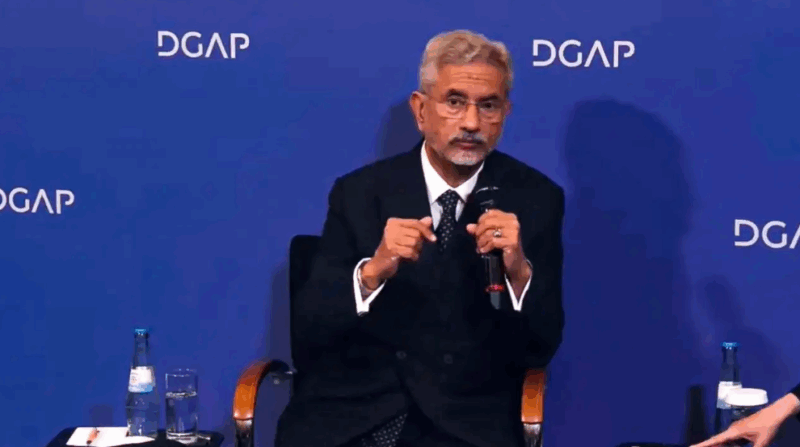Speaking at a joint press conference in Berlin alongside his German counterpart, Johann Wadephul, Jaishankar said, “India has zero-tolerance for terrorism. India will never give in to nuclear blackmail.”

External Affairs Minister S Jaishankar on Friday reaffirmed India’s firm stance against terrorism, declaring that the country will “never give in to nuclear blackmail” while addressing cross-border links to the deadly terrorist attack in Jammu and Kashmir’s Pahalgam.
Speaking at a joint press conference in Berlin alongside his German counterpart, Johann Wadephul, Jaishankar said, “India has zero-tolerance for terrorism. India will never give in to nuclear blackmail.”
He added, “India will deal with Pakistan purely bilaterally. There should be no confusion in any quarter in that regard.”
Jaishankar’s comments come during a visit to Germany, part of a three-nation tour of Europe. His remarks followed discussions with Wadephul, during which both leaders addressed regional security, counterterrorism, and bilateral cooperation.
Wadephul, speaking in German, condemned the April 22 Pahalgam terror attack that killed 26 people and expressed support for India’s right to defend itself, according to official sources.
Jaishankar praised Germany’s understanding of India’s security concerns, stating, “India values Germany’s understanding that every nation has a right to defend itself against terrorism.”
In response to the Pahalgam attack, India carried out precision strikes on May 7 targeting nine terror camps in Pakistan-occupied Kashmir under Operation Sindoor. Pakistan retaliated with attempted strikes on Indian military installations on May 8, 9, and 10. Hostilities between the two countries ceased after four days of conflict, with an understanding reached on May 10.
Prime Minister Narendra Modi has since declared a “new normal,” stating that any act of cross-border terrorism will be treated as an act of war by India.
During the press conference, both ministers marked 25 years of strategic partnership between India and Germany. Wadephul noted the growing diversity of bilateral ties, saying Germany wants to “deepen our ties,” while Jaishankar highlighted that the relationship has “gained much stronger momentum.”
Jaishankar also met with German Chancellor Friedrich Merz and acknowledged his commitment to strengthening bilateral relations.
“Our talks addressed different dimensions of our bilateral cooperation, they ranged from trade to technology and investment, to defence, security, energy, sustainability, mobility of talent and societal exchanges,” Jaishankar said.
He noted that discussions also covered a wide range of regional and global issues, describing Germany as “a really important partner.”
“We cooperate in forums like the G4… to the G20,” he said, referring to multilateral groupings where both countries are active participants.
Jaishankar pointed to a shifting global landscape, saying, “The world order is under considerable churn, the political uncertainty is as evident as economic volatility,” and highlighted the challenges posed by emerging technologies like artificial intelligence.
He also praised Germany’s support for the India-EU free trade agreement, which leaders have aimed to conclude by the end of this year.
“Germany has been one of the most consistent and powerful supporters of rapidly doing a free trade agreement,” he said. “I am confident that if the two countries can meet the goal of FTA this year, there will be many more doors that will be opened to businesses on both sides.”
Prime Minister Modi and European Commission President Ursula von der Leyen have both expressed a desire to finalize the agreement this year to boost cooperation in areas such as defense, security, and critical technologies.







